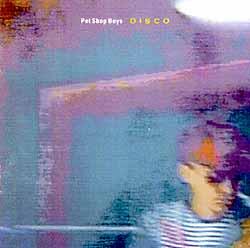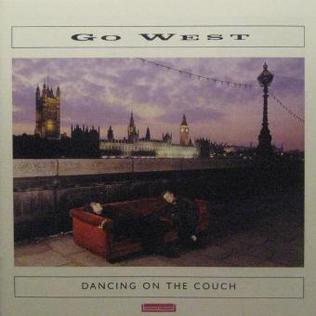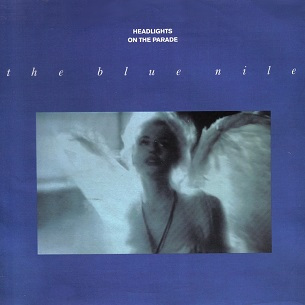
Disco is the first remix album by English synth-pop duo Pet Shop Boys, released on 17 November 1986 by Parlophone in the United Kingdom and by EMI America Records in the United States. Disco consists of remixes of tracks from the band's debut album Please and its respective B-sides. The album includes remixes by Arthur Baker, Shep Pettibone and Pet Shop Boys themselves.

Spartacus is the debut studio album by British rock band the Farm, released on 4 March 1991 through Produce Records. Following a variety of member changes and single releases, the band solidified their line-up in 1987; after a record deal fell through, they opted to start their own label, Produce Records. They recorded the bulk of their debut album in London in 1990 with former Madness frontman Graham "Suggs" McPherson as producer; one track from 1987 was produced by the Housemartins members Paul Heaton and Stan Cullimore. Spartacus is a baggy and dance-rock album that takes influence from the work of Buzzcocks, the Clash and the Jam.

Kite is the breakthrough second album by Kirsty MacColl, released in 1989. Produced by her then-husband Steve Lillywhite, it was her first album for Virgin Records. The album included MacColl's hit cover of the Kinks' "Days", as well as two tracks written with Smiths guitarist Johnny Marr. On 6 October 1989, it was certified silver by the BPI.

The Innocents is the third studio album by English synth-pop duo Erasure, released on 10 April 1988 by Sire and Reprise Records in the United States and on 18 April 1988 by Mute Records in Germany and the United Kingdom. Produced by Stephen Hague, it was the release that made Erasure superstars in their home country of the UK and gave them their breakthrough in the US.

Love Moves is the seventh studio album by English pop singer Kim Wilde, released in May 1990 by MCA Records. The album was not released in North America.

"Americanos" is a song by English singer Holly Johnson, released in 1989 as the second single from his debut solo album, Blast (1989). It was written by Johnson, and produced by Andy Richards and Steve Lovell, with additional production from Dan Hartman.

"Thursday's Child" is a song by British singer-songwriter Tanita Tikaram, released in 1990 as the third and last single from her second studio album, The Sweet Keeper. A remixed version of the song was made for its release as a single.

"Soundtrack to a Generation" is a song by English synth-pop band the Human League. It is taken from the album Romantic?, from 1990.

Blast is the debut solo album by the English singer and musician Holly Johnson. It was released in 1989 and reached No. 1 in the UK Albums Chart and sold over 300,000 copies making it platinum. The album stayed on the charts for 17 weeks. The album features the hits "Love Train", "Americanos", "Atomic City" and "Heaven's Here". The album was re-released in November 2009 and again in November 2010.

"Where Has Love Gone?" is a song by British singer-songwriter Holly Johnson, released in 1990 as the lead single from his second studio album Dreams That Money Can't Buy (1991). The song was written by Johnson and produced by Andy Richards.

Dreams That Money Can't Buy is the second solo studio album by the English singer and musician Holly Johnson, released by MCA Records in 1991. The album was produced by Andy Richards, except "Penny Arcade" which was produced by Dan Hartman.

"Heaven's Here" a song by English singer Holly Johnson, released in 1989 as the fourth and final single from his debut solo album Blast. It was written by Johnson and produced by Stephen Hague. The song reached No. 62 in the UK and No. 22 in Ireland.

Dancing on the Couch is the second studio album by English pop duo Go West, released in 1987. It reached number 19 on the UK Albums Chart.

"Ruby Red" is a song by English rock band Slade, released in 1982 as the third single from the band's tenth studio album, Till Deaf Do Us Part. It was written by lead vocalist Noddy Holder and bassist Jim Lea, and was produced by Slade. "Ruby Red" reached number 51 in the UK Singles Chart and remained in the top 75 for three weeks.

"Elisabeth's Eyes" is a song by English musician Nik Kershaw, released in 1989 as the second and final single from his fourth studio album, The Works (1989). It was written by Kershaw, and produced by Kershaw and Julian Mendelsohn.

"Save Me" is a song by Scottish rock band Big Country, released in 1990 as a single from their compilation album Through a Big Country: Greatest Hits. The song was written by Stuart Adamson and produced by Tim Palmer. It reached number 41 in the UK Singles Chart and remained in the top 100 for three weeks.

"Obscurity Knocks" is a song by Scottish band The Trash Can Sinatras, which was released in 1990 as an extended play from their debut studio album Cake. It was written by all five band members and produced by Roger Béchirian. The EP reached No. 86 in the UK and remained on the chart for four weeks. In 1991, the song reached No. 12 on the Billboard Modern Rock Tracks chart.

"Peace in Our Time" is a song by Scottish rock band Big Country, released in 1989 as the third and final single from their fourth studio album Peace in Our Time (1988). It was written by Stuart Adamson and produced by Peter Wolf. "Peace in Our Time" reached number 39 in the UK Singles Chart and remained in the top 100 for three weeks.

"Headlights on the Parade" is a song by Scottish band The Blue Nile, released in 1990 as the second single from their second studio album Hats (1989). The song was written by Paul Buchanan and produced by the band. It reached number 72 in the UK Singles Chart and remained in the top 100 for four weeks.

"Saturday Night" is a song by Scottish band The Blue Nile, released in 1991 as the third and final single from their second studio album Hats (1989). It was written by Paul Buchanan and produced by the band. "Saturday Night" reached number 50 in the UK Singles Chart and remained in the top 100 for three weeks. It remains the band's highest charting single in the UK.




















